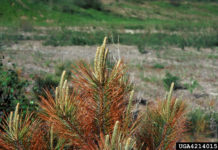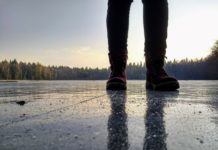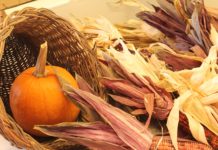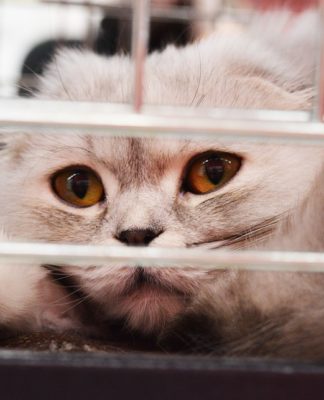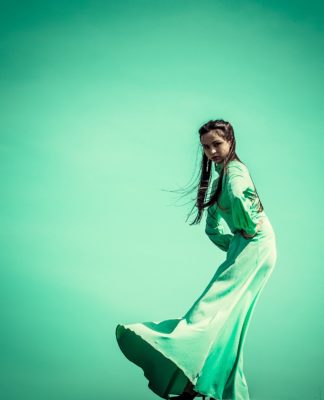We take the train west from Union Depot in St. Paul through North Dakota into Montana. We stop in Glacier National Park for a three-day hike and then continue the journey through Idaho into Washington, through Tacoma, and into Seattle.
On the train: We pass mountains, covered in trees, beneath a cyan sky. The sun shining over an old Cadillac driving on the road alongside us. We pass lakes and running streams and rivers. The folk music we hear coming from the bar up the hill, guitars, banjos, mandolins, raucous voices for a moment quiets as the train rolls on.
Watching the world, the countryside, and this America-the-beautiful of vast landscapes and seemingly-endless expanse pass this way, shooting bullets past the window as the train picks up speed, then slowing to a molasses halt in small towns, in Minot, in Williston, in Havre, in Shelby… After eight, ten, twelve hours on the train you begin to have wild thoughts – that the world might need you after all, that there is no corner too small in which to hide, and there is no field, no prairie, no bluff, no mountain peak, no sky too large to hold in your hands. You lose your humility and get it back, swallowed whole by a landscape that grows and changes around you, rumbling with the train along the tracks.
Terra Firma
We arrive in East Glacier in the evening, breathe fresh air, hold it in our lungs. We stretch our legs, arms, sigh deep and regard the static world anew, the grass and flowers, the mountains in the distance.
We ride in a 2007 Ford Explorer from the town of East Glacier (where the train station is) to the village of St. Mary, where we’ll camp at a site, called The Heart of Glacier, before hiking out through the mountains in the morning. Our driver, a woman of the Blackfeet tribe native to the area, gives us dried sage gathered from the mountainside, says it will keep the bugs away, bring us good luck. She laughs easy, tells jokes, tells us about the land, pauses to hear our thoughts. She takes us to the overlook and the very-best views of the pass, the gorge and valley below, Going-to-the-Sun Road, Logan Pass, Lake McDonald.
The places you know, things you see when the land is your home, the special things we like to share with others, she wants us to see the world through her eyes.
She tells us the story of Running Eagle, the only woman allowed to join the warriors of the Blackfeet Nation over a hundred years ago, we pass a waterfall named for her. When Running Eagle finally fell in battle, she was given a true warrior’s tribute, remembered as tough-or-tougher than the rest.
Her sister, sitting next to her in the passenger’s seat says: We drove a woman the other day from the station, she said to me, It sure would be nice to see a real-live Indian while I’m here… She laughs, long wrinkles running down her cheeks – I said, Nice to meet you! But she didn’t understand. I guess I don’t look Indian enough for tourists. People don’t understand that we use tipis only because we want to, keep the old ways and old culture alive only because we choose to, because many of us still feel a connection to it. Because, against the odds, we are still here.
We hit a bump in the road, sit quiet for a moment, appreciating the quiet, and the view from the window.
The Hike
We hike from St. Mary in the morning. We reach our campsite hidden between trees and rock at the edge of a lake. The lake is peaceful, serene, the surface still, like glass, tucked at the foot of the mountains (Goat Mountain). It’s a small lake, azure from the sky, hard to find unless you know where to look. Still until trout jump from the surface, making ripples in the glass. A man in tall boots fly-fishes from the shore, more catch-and-release, but a few saved for dinner. Swaths of trees line the glacier at the mountain’s ridge, running to a stream. The stream leads to the lake. The sun shines in a splay of light over the mountain peak.
A smooth, gray stone sits on the edge of the path. It tumbled from the mountain when Mother Nature called for water, when she shouted for the river to flow between the crevice and the northeast crag beyond the trees. The stone is quiet now, watching hikers and their packs and sticks and sweat, their shoes crossing overhead, their stories echo, This is life. When the rain comes it washes away footprints and the rock is clean again for the next band of travelers. These rocks don’t have thoughts the way we do, but they still bear witness, and their views are as important as ours – they have seen more than we have, learned from the water in the lake, the glaciers and streams, over time, they remind us of where we walk; that we walk on endless past.
A small brown bear along the path eats berries from a bush. Two women we meet on the path tell us how they had forgotten, the night before, to hang their food stores from a tree and had met a hungry grizzly in the morning. After, they made love in their tent, having survived their encounter with the bear (though without much of their food; we share some of ours), laughing endlessly with a new appreciation for life and smaller things.
The sun sets over the lake. The woods grow quiet at night. Only the sound of water from the stream, the mosquitoes and gnats and horseflies and June bugs buzzing through trees ravaged by a fire four-years before. The rock knows the steps of everyone who passes this way. It remembers the camper who started the fire, the unattended pit, the smoke, the carnage that followed. It sees the trees now ash-black and ghostly white, as leafless poles, lifeless poles, sleek, dead.
We rarely care for the lives of bugs buzzing and insects, they are not seen as beautiful, or smart, or strong.
A doe runs an arm’s-length away from us through the trees. There are moose and elk in these woods, but they stay hidden in the brush. We pass the brown bear eating by his stump, maybe 10-feet from the path, and we see another grizzly lumbering maybe ten meters the other way – we have no food, we are not interesting to them. The mountain goats are friendly and pose for a group of tourists, we see three or four just starting to shed their coats this time of year. Marmots are slick, crafty little creatures; will sneak up and steal your shoes. The ground squirrels are our friends, we name them Walter, Lucy, Charles, Thomas, Sally… Ospreys and eagles call overhead, flying from tree-to-tree, to tell us these are not the right names.
Breakfast, lunch, dinner, or just a snack for now.
In the morning. We climb the bluffs, up the stream, to the small falls above, the sun is out, and we are alone here by the water. We swim naked (go skinny-dipping) in the lake and the water is frigid-cold. There is something liberating in the water, your body suspended, floating, different than on the train, and we swim, kicking our feet back to the shore, where we sit shivering, waiting for the sun to warm us again.
The water is clean enough to drink. This was how it was everywhere, once.
On Nature
Mother Nature yawns and she makes a canyon. She coughs and there are mountains. She whistles, and through her teeth come rivers and lakes and oceans with the wind. It is not hard for Mother Nature to build worlds.
The trees all have their stories, as it is said, they whisper in the wind. Maple, pine, cedar, oak, aspen, birch, fir… Larch trees are caretakers of the rain and they stand a little taller for rainbows, after a storm, watching the many-colored bridge curve across the sky. Birds that roost in these trees, robins especially, and build their nests there, know how much the trees have to say, and how rare it is to find someone who listens well enough to hear.
In our tent: We let sleep take us without a fight, listen to the trees and the wind sing softly now for the animals that stay awake at night. We know there are bears in these woods, and we are not the master here. We appreciate, with a certain self-effacement, the power of living things, somatic things, and a place that is their home.
It is not hard for Mother Nature to make worlds, no, but it wasn’t so easy for Man: We had to learn everything the hard way, as we went along, stumbling and learning from our movements and our mistakes. We have come far. We have come a long way from where we started. Though it isn’t hard to think of humanity as a wooden rowboat knocking against the dock of some coastal enclave, always close to shore, but ready to go out again.
Or maybe that’s too quaint. Maybe we’re a forest fire, a bull in a china shop, an orangutan escaped from the zoo and terrorizing downtown Manhattan. Maybe we’re everything all at once, or maybe we’re nothing at all.
Mother Nature loves us yes, but she certainly does not need us.
This post was created as a part of the MNTravel series sponsored by Twin Cities Agenda, produced and written by Adrian Daniel Schramm.
Read this next: Now India (7 Minutes to Sunrise)





